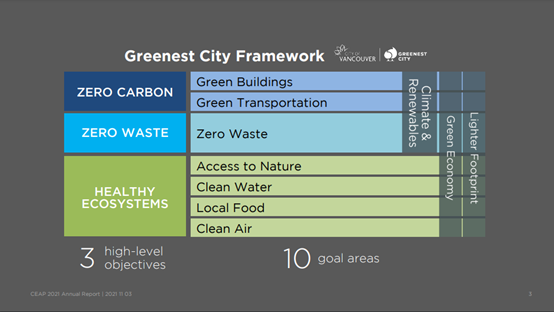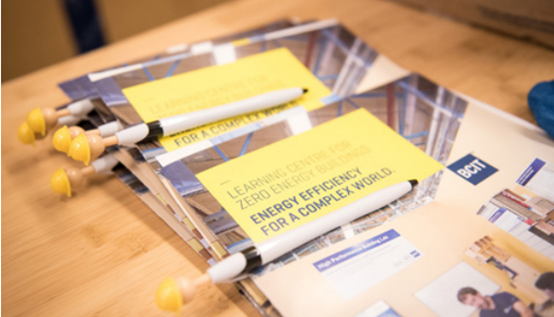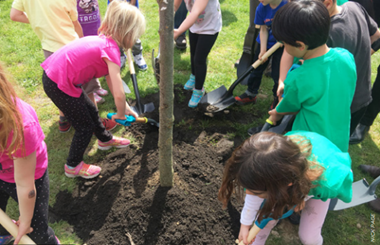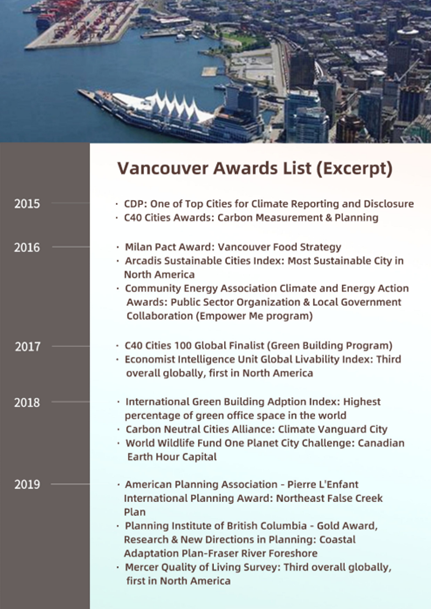Echo of Cities | Vancouver, Canada: The Greenest City Initiative
In 2012, Vancouver participated in the
first Guangzhou Award with its Greenest City 2020 Initiative, and stood out as the winner from the 255 initiatives. The
initiative is led by the city government, covering energy, waste, ecosystem,
and housing areas, with a wide range of intertwined goals to create a green and
sustainable Vancouver.
Since then, it has been a decade from the first Guangzhou Award. Does Vancouver, the winner of the Award, still follow up on its innovative Greenest City action? During the ten years, what new actions does the city launched? Looking at the initiative’s origin and its recent development, today’s Echo of Cities will take you into Vancouver and see its journey to Greenest City.
About the initiative:Construct a Solid Base of the Greenest City
Vancouver has a long history and strong community support for environmental sustainability and climate action. The Greenest City Initiative is a key component in the ongoing evolution of Vancouver’s planning and development policies first set in the early 1970s. It brings a comprehensive focus to the city’s ongoing sustainability efforts with three themes titled: Zero Carbon, Zero Waste, and Healthy Eco Systems providing the framework for the plan’s implementation.

Figure: Vancouver Greenest City Framework
From: Presentation to the
Vancouver Council: Greenest City
Action Plan 2015-2020
Before the forming of the Greenest
City initiative, the City of Vancouver had already made significant advances in
addressing climate change and creating a sustainable city. In late 1988, the
city launched one of the first task forces in the world to examine the impact
of atmospheric change on municipal planning and activities. The result was the
release of Clouds of Change in June 1990, a report that described the goals set by
Vancouver’s Task Force on Atmospheric Change. In 2003, the city launched the
Cool Vancouver Task Force. Its recommendations led to the creation of two 2005
action plans: one to reduce emissions from municipal operations and the other
to reduce community-wide emissions.
With a solid foundation, the City of
Vancouver launched its Greenest City Initiative in February 2009, involving all
levels of city government, citizens, and business in a variety of initiatives,
forums, and outreach programs. In 2011, the Council approved the Greenest City
Action Plan (GCAP), a road map for Vancouver to become the greenest city in the
world by 2020.
Meanwhile, the Council launched the Mayor’s Housing Affordability Task Force, a major initiative to ensure Vancouver remains an affordable city for all by facilitating innovative housing solutions throughout the city. Using a combination of development and conversion fees, leveraging city resources such as property, and working with other levels of government, Vancouver has been able to replace aging single rooms with new purpose-built accommodations and provide new housing for families.
With the vision of tackling climate change
and building a green city, the comprehensive management system, and a top-down
applicable approach, Vancouver successfully stands out as the winner of the
first Guangzhou Award, setting a sample for other cities in how to develop a
green and sustainable city.
Initiative Updates: GCAT to Ensure the
Sustainable Development of the Initiative
After winning the Guangzhou Award, Vancouver has kept processing its initiative. In a vision of making Vancouver the Greenest City by 2020, the city launched the Greenest City Action Team (GCAT) with a detailed and comprehensive plan. During the decade, the Council has implemented a suite of priority actions according to different situations, while the Team has presented update and progress to it. All related reports have published on the website, ensuring the sustainability of the Greenest City Initiative.

Figure: Related Plans and Implementation Update of Greenest City
Initiative
From: Greenest City Action Plan Implementation Update
2017-2018
Since 2011, Council provided directional approval to implement a suite of 125 priority actions to be implemented by the end of 2014. In 2015, half-way through the plan, 80% of the original 2012-2014 priority actions were completed. Then, City staff in consultation with over 300 internal and external advisers, have identified over 50 priority actions for 2015 to 2020. Some successes have been seen throughout the city: the distance of vehicle kilometers driven per person and the amount of solid waste sent to landfill and incinerator decrease steadily. Compared with 2008, the amount of solid waste sent to landfill and incinerator decreased by 28% in 2018. In the same year, the distance of vehicle KM driven per person decreased by 38% compared with 2007, with more than 50% of residents going out on foot, by bike, or by public transport. The number of new trees planted has increased rapidly, exceeding 100000 in 2018.

From: Greenest City Action Plan Implementation Update 2017-2018
During the implementation of the Greenest City Initiative, Vancouver has won a number of awards in addressing climate change and building a green city:

Although the Greenest City Action Plan doesn’t 100% realize its vision of making Vancouver the Greenest City by 2020, it reaches its climax in 2020: a bike network nearly 330 km long, including the longest uninterrupted waterfront path; 150,000 trees planted, and 34 hectares of restored or enhanced; nearly 45,000 people taking personal action on the goals of Greenest City goals through City-led or supported programs.
Today, Vancouver is still building on previous successes to meet its goal on building a green city. One part of it is the Climate Emergency Action Plan (CEAP), which will cut Vancouver’s carbon pollution in half by 2030, and engage residents in a broader environmental plan. By doing this, Vancouver is devoted to carrying on its Greenest City Initiative in an extensive and sustainable way to create a green, livable and beautiful city.
Sources:
https://vancouver.ca/green-vancouver/greenest-city-action-plan.aspx
The top green cities for recycling in the world. (2021). businesswaste.co.uk
https://www.businesswaste.co.uk/the-greenest-cities-in-the-world/
Author: Gong Yuanlin (intern)
Editor: Li Yuan / Ye Yongyan (intern)


 In Focus | World Cities Day: People-Centred Smart Cities
In Focus | World Cities Day: People-Centred Smart Cities City Stories | Fostering community resilience: A lifeline for the Central African Republic
City Stories | Fostering community resilience: A lifeline for the Central African Republic In Focus | Innovative Education, Empowering Futures
In Focus | Innovative Education, Empowering Futures




















 Tel: +86 020 3780 4434
Tel: +86 020 3780 4434 Email: info@guangzhouaward.org
Email: info@guangzhouaward.org Adress: Unit 01-7, 28th Floor, No. 7, Chunrong 3rd Road, Tianhe District, Guangzhou, Guangdong, 510000, PRC
Adress: Unit 01-7, 28th Floor, No. 7, Chunrong 3rd Road, Tianhe District, Guangzhou, Guangdong, 510000, PRC




